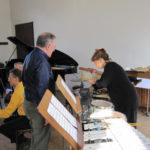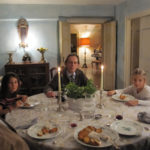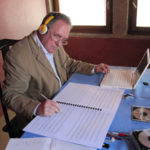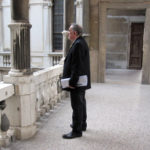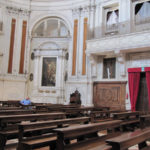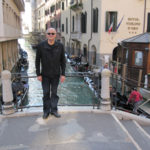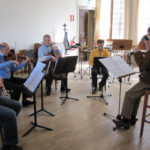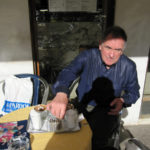
Alcibiades being taught by Socrates
(The sound of wind in trees) (a spotlight illuminates two characters sitting next to each other on stage, Tybert to the left and Rose to the right)
Tybert (T): Can you tell me please, Rose, should a new and original kind of music be arrived at by thinking hard and planning hard, or in some other way?
Rose (R): If you put a question like that to anyone around here, they will probably dismiss it and tell you just to write down or to perform the music that comes to you from your imagination. For myself, I don’t have an immediate answer to your question. I am clueless in so many things.
By the way Tybert, are you male or female? You are so covered with fur it is not easy to tell. You see how ignorant I am……..
T: If I am so covered with fur that you don’t know my gender, then leave it at that. What does it matter? I go by the name of Tibby in any case and that should do for any gender. Now can you answer my question?
R: Well, let us leave the issue of gender to one side. You yourself, my handsome Tibby, what do you say that the words “new, original, thinking and planning” mean? Are these words easily defined? And I hardly dare ask you what “music” is, because I see that you have little patience. Speak and reply to an ignorant old woman’s question and prove yourself knowledgeable.
T: So you avoid my question by replying with a question. A very cheap trick, if I may say so.
“New and original” are things that haven’t been done before. “Thinking and planning” are words equally easy to define – anybody who remembers that it might rain and takes an umbrella to work has done that; and music is sound that has been organized by a human mind.
R: O my fine Tibby, not only is your glossy fur a joy to behold, but you claw your way through the difficulties I present you with ease. I see I have great good fortune in encountering someone so wise. I thought you might labour over these issues, as I myself have done. But tell me Tibby, if someone writes a piece for violin solo, is that something new or something original?
T: Well, that depends on the style. If it sounds, like Wieniawski, then, clearly, it’s not original, but it is new.
(Wieniawski)
R: Good, so now we have opened up a gap between what is new and what is new, but also original. Perhaps we can also open up gaps within those words. For example, are there degrees of originality? Is Sibelius as original as Schoenberg?
T: They are equally original but Schoenberg sounds newer than Sibelius. In Sibelius you have many memories of older music.
(Sibelius’s music)
R: I think perhaps you have forgotten that beautiful perfect 5th near to the beginning of Schoenberg’s Variations for Orchestra. That sounds quite ancient to me. But I agree with you that Schoenberg’s music frequently sounds newer than that of Sibelius. I also agree with you that they are equally original.
(Schoenberg’s music)
I think we begin to see that what is new or original is not a simple matter of “things which haven’t been done before” but more complex. And indeed if we find a piece for solo violin which is, let us say, completely new and completely original, isn’t even the idea of writing a solo violin piece already an old one?
(Bach violin music)
T: Well yes of course it’s an old idea. No music is entirely new nor entirely original. Indeed if it were, perhaps we shouldn’t even be able to call it music.
R: Exactly. And that brings me to your definition of music as “sound organized by a human mind”. Neat though that definition is, I find it lacking.
T: As a matter of fact, I think my definition can apply to all music of any style or tradition throughout human history.
R: And if a small child in a pram is wheeled through a tunnel by its mother (I am thinking of one of those underpasses that we use in order to get from one side of the street to the other) and starts to use its voice to enjoy the echo, is that also “sound organized by a human mind” and therefore music? The tunnel is certainly not a concert hall and it probably smells of piss, with a few dried up turds scattered around as well………..but it is at that moment a “music venue”, as they say, albeit a very dusty one.
(a child making vocal sounds echoing around)
T: I hardly think that a screaming child is music. Where is the organization there?
R: And where is the “organization” in any improvisation? It’s organized, yes? Or it’s organized, no? You could argue both ways. I’d rather cut that word right out of the discussion.
T: I was including improvisation in my definition, because that is the human mind organizing sound in a very fast manner, though I admit I hadn’t quite thought of a screaming child as improvising. That is a stretch, but I suppose you are right.
R: Indeed I am right. A child making sounds in the circumstances I describe is making music. Organized, or not, there it is, and you will find that the creation of music and of images and of stories is founded in what we do as children. All three activities fascinate children. Well, we say they are “playing”. We could also take that word apart, just as we are doing with the other words here, but let’s leave that issue on one side, we already have enough to deal with.
T: By all means, let us leave at least some word definitions on one side. It is not I who am making such a fuss about simple definitions, it is you. Your probing into everything gives me a suffocating feeling. I don’t want to be choking on all this unnecessary questioning.
R: My dear Tibby, forgive me, I believe you asked me a question and I am trying to answer it, that is all. Perhaps I should tickle you under the chin and that will calm you down..
T: I’d prefer you to keep your hands to yourself. Just let me run up and down this curtain a few times and I will feel better.
R: Very well, you do that. And I will take a sip of this wine meanwhile.
(silence) (pause)
********************************************************************************
(the sound of a child’s echoing voice)
R: Now did we establish that a child improvising with its voice is also producing music?
T: Yes Rose we did, though I hadn’t thought of it that way before.
R: Good, because many people have not recognized that children are making making music a lot during the course of the day. They invent and perform music with their voices and their banging around.
Our modern aesthete possibly imagines the smelly underpass I describe with a feeling little short of horror. I myself find that these little nooks and crannies in the contemporary world can be strangely exciting……….But let us transport our fragile aesthete to somewhere more in line with their tastes. To a pine forest somewhere in an alpine landscape, shall we say? It is a windy day and the tops of trees are waving to and fro. They make a marvelous sound and our aesthete sits on a log to listen carefully. I hear them mutter “what a beautiful music”.
(the sound of wind in trees)
T: Well they could hear it that way, but the most you could honestly say about it would be that it is musical.
R: So a sound can be musical, without being music?
T: Of course
R: But you spoke of organized sound and so I think you need to explain what happens to the musical aspect of sound once we remove the human organization. There is no human organization in the sound of wind in trees, but you admit that it can be musical. I suggest to you that whether sound is music, or at least musical, does not have to reflect human organization.
T; Now you are going too far and by the way, did I ever tell you that your old neck wobbling around makes you look like a frog?
(the sound of frogs)
R: I suggest to you that sound sometimes becomes music simply because of the way we listen to it.
T: You are a crazy old frog. You might as well say that a pile of bricks becomes a work of art just because of the way we look at it.
R: You are exactly right. A pile of bricks can indeed become a work of art in certain circumstances.
T: Oh just hop off somewhere will you?
R: It can, just in the way that a slip of paper can become a treasure once a love letter is written on it – a treasure so precious that you hardly dare touch it. But what would you know about love letters? I saw you perched on that fence the other day………you were being visited by several admirers. They were…….
T: Oh shut up you old frog. You have no admirers, that’s clear.
(Tybert exits)
R: You asked a good question in the beginning, but are we anywhere near to an answer? No, we’re not, because you don’t have the patience to find an answer.
Tibby?………………….. Oh, she’s gone. Or he is. I’ll just sit here and finish my wine.
(frog sounds) (light fades to darkness)

